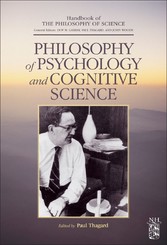Suchen und Finden
Mehr zum Inhalt

Philosophy of Psychology and Cognitive Science - A Volume of the Handbook of the Philosophy of Science Series
Title Page
4
Copyright Page
5
Table of Contents
8
General Preface
6
Introduction to the Philosophy of Psychology and Cognitive Science
10
1 Psychology and cognitive science
10
2 Philosophy and science
11
3 Epistemological issues
13
4 Metaphysical issues
15
5 Ethical issues
15
6 Overview of the book
16
List of Contributors
20
Representation
22
1 The fundamental problem of representation
22
2 The standard model of representing and representation
24
3 Representation and information
27
4 Representation and implementation
30
5 Typologies of representation
32
6 Varieties of representations
32
Bibliography
46
Mechanisms and Psychological Explanation
52
1 Introduction
52
2 The rise of the mechanical philosophy and its application to the mind
53
3 Information-processing mechanisms and their application to psychology
59
4 Contemporary conceptions of mechanism
65
5 Mechanistic explanation
67
6 Hierarchical mechanisms, levels of organization, and reduction
75
7 Discovering mechanisms
82
8 Mechanistic explanation in psychology: motivation and reward
86
9 Summary
93
Bibliography
94
Realization: Metaphysical and Scientific Perspectives
102
1 A servant of two masters
102
2 Realization and the metaphysics of mind
105
3 Realization and the cognitive sciences
107
4 A working account of realization
114
5 Autonomy, reduction, and multiple realization
119
6 Conclusion: Getting our heads together
123
Acknowledgements
124
Bibliography
124
Reduction: Models of Cross-Scientific Relations and their Implications for the Psychology-Neuroscience Interface
126
1 Introduction
126
2 The standard model of reduction and new wave revisionism
129
3 The new wave continuum of the comparative goodness of intertheoretic mapping
134
4 Two arguments for non-reductive materialism
136
5 Not so new wave reductionism (after all): mutual preoccupation with theories
141
6 Not so new wave reductionism (after all): Insistence on a single model
149
7 Explanatory pluralism in cross-scientific settings
157
8 Multiple realizability as an argument for (not against) reducibility
162
9 Mechanistic analysis as explanatory pluralism writ small
168
10 Heuristic identity theory and the explanatory gap objection
171
Bibliography
175
Perception Preattentive and Phenomenal
180
1 The architecture of early vision
181
2 Competition, selection, attention
188
3 Features and phenomenal properties
193
4 Preattentive phenomenal properties
196
5 Phenomenal consciousness, but hold the consciousness
201
6 Philosophical implications of divorce
203
7 Perceptual psychology after divorce
205
8 Conclusions
211
Bibliography
212
Consciousness: Phenomenal Consciousness, Access Consciousness, and Scientific Practice
216
1 Introduction: Consciousness and the philosophy of science
216
2 The phenomenological structure of phenomenal consciousness
217
3 Phenomenal consciousness, access consciousness, and subjective character
220
4 Case studies from the cognitive sciences
228
5 Conclusion: In defense of scientific practice
236
Acknowledgements
237
Bibliography
237
On Restricting the Evidence Base for Linguistics
240
1 Introduction
240
2 Jerrold katz: An ontological argument for restriction
241
3 Quine: A radical empiricist argument for restriction
245
4 Wittgenstein: A ‘normative community practice’ argument for restriction
247
5 Against restricting the evidence base
250
6 A detailed example
260
Acknowledgements
266
Bibliography
266
Emotion: Competing Theories and Philosophical Issues
268
1 Introduction
268
2 Theories of emotion
268
3 Three philosophical issues
280
Bibliography
285
Simulation
288
1 Introduction
288
2 Alternatives to simulation
289
3 Simulation theory
293
4 Development: False-belief tasks
295
5 Simulation and mirror systems
298
6 Simulation and imagery
300
7 Simulational mindreading of emotions
301
8 High-level mindreading
304
9 Conclusion
308
Bibliography
309
The Theoretical and Methodological Foundations of Cognitive Neuroscience
316
1 Trends in the contributing research areas
317
2 Cognitive neuroscience methodology
320
Bibliography
331
Computational Neuroscience
334
1 Overview
334
2 Representation
337
3 Computation
347
4 Dynamics
348
5 Synthesis
350
6 Cognition
352
Bibliography
355
Psychopathology: Minding Mental Illness
360
1 What is mental illness?
360
2 Mental qua mental illness
363
3 Clarification of proposal
364
4 Mental distress and problems of living
367
5 Conscious representational content
369
6 Restricting the mental
371
7 Broken brain
373
8 Conscious representational content and environmental interaction
375
9 Mental illness regimented and treated
380
10 Conclusion
384
Bibliography
385
The Adaptive Programme of Evolutionary Psychology
390
1 The program of evolutionary psychology
390
2 Engineering design and EP
403
3 Dynamic models of natural selection
409
4 Dynamic models of design
409
5 Phylogeny and adaptation
415
6 Conclusion: Evolutionary psychology and evolution
425
Bibliography
428
Situated Cognition
434
1 Introduction
434
2 Examples
436
3 Epistemological Reflections
444
Acknowledgements
447
Bibliography
447
Artificial Intelligence: History, Foundations, and Philosophical Issues
450
Part One The History and Development of Artificial Intelligence
450
1 The origins of AI
450
2 Early AI programs
455
3 Micro-world AI
458
4 The development of neuron-like computing
461
5 Nouvelle AI
464
Part Two Philosophical Issues
468
6 The turing test
468
7 The Chinese room argument
477
8 Hypercomputation
484
9 Penrose’s ‘Gödel objection’ to AI
492
Bibliography
496
Index
504
Alle Preise verstehen sich inklusive der gesetzlichen MwSt.









